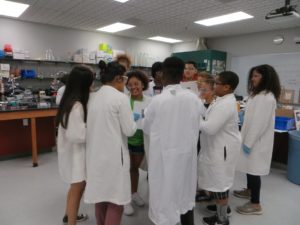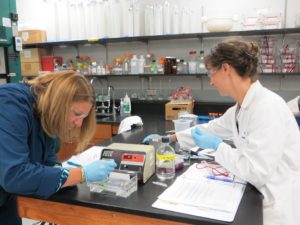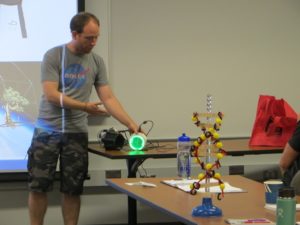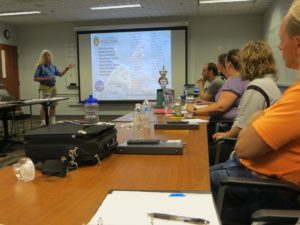The BioPharmaceutical Technology Center Institute (BTC Institute) has been a member of the Wisconsin Space Grant Consortium (WSGC) since 2002. As an educational arm of NASA, the mission of WSGC “is to use the excitement and vision of space and aerospace science to equip the citizens of Wisconsin with the math, science and technology tools they need to thrive in the 21st century.”
Also as noted on WSGC’s website, “The mission of NASA’s Space Grant Program is to contribute to the nation’s science enterprise by funding education, research, and informal education projects through a national network of university-based Space Grant consortia.” Members of these consortia include academic institutions, government agencies, businesses and other educational organizations, such as the BTC Institute.
Of particular relevance to the WSGC/BTC Institute partnership, Space Grant Program goals include working to:
- Recruit and train professionals, especially women, and underrepresented minorities, and persons with disabilities, for careers in aerospace related fields.
- Develop a strong science, mathematics, and technology education base from elementary through university levels.
We have consistently received grants from WSGC’s Special Initiatives Program (SIP) and Aerospace Outreach Program (AOP). SIP funding has supported our Celebration of Life summer sessions for upper elementary and middle school students; AOP grants have contributed to the development and implementation of courses and workshops for middle and high school teachers.
Elementary school students participating in A Celebration of Life XXII: Life in Space!
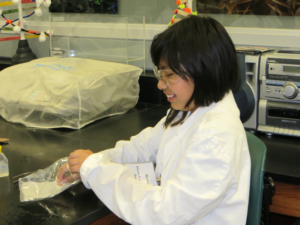
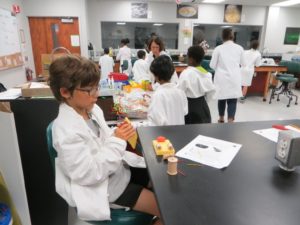
Middle schools students in A Celebration of Life XXII: Life in Space! – getting ready to model gel electrophoresis
Participating in our inaugural Biotechnology: The Basics for Middle School Teachers
Our niche in WSGC has been fairly unique: we are the only member that focuses on the relevance of molecular biology/biotechnology to NASA’s efforts. This year, we are excited to be working with two UW-Madison scientists, Dr. Richard Barker, (Assistant Scientist, Botany Department) and Dr. Simon Gilroy (Professor, Botany Department) to develop a new Biotechnology Field Trip experience for high school students that will feature techniques utilized in a field of astrobiology. (For more on their work, please visit: http://www.botany.wisc.edu/gilroy/people.html.)
This new partnership has evolved from their contributions to our summer courses for teachers. Teachers who receive stipends are required to implement NASA-related activities with their students and to report back, describing related classroom experiences. These summaries are typically very inspiring – and gratifying – to read. As one 2016 course participant, a teacher in Milwaukee shared:
We also recently discussed the vast and depth of our universe. This naturally led us to discuss some of the research that NASA is conducting in space especially with how we might be able to grow plants up in space. It was great to hear from Dr. Gilroy last summer as his insight helped me structure some discussion about some of the works done by NASA and how they are utilizing biological research up in space. My earth science students enjoyed this connection as when we began talking about how space might be habitable, we were able to talk about how our earth’s system allows us to live, as well as tapping in on some of their biological memory of photosynthesis and discovering how this could be replicated in space. The discussion ranged and was great along with a lot of different tangents that occur with space talk. Little did students know, they were already imagining what space life could be, which only is advanced through biotech.
Dr. Richard Barker and Dr. Simon Gilroy in action with teachers
When it comes to biotechnology and space, it would appear that the sky’s the limit. As
Dr. Kevin Crosby, WSGC Director and Professor of Physics and Astronomy, and Computer Science at Carthage College, told me at this year’s Wisconsin Space Conference, more than half of the experiments now being sent up to the International Space Station are molecular biology-based. We appreciate the opportunities we have through our partnership with WSGC to assist students and teachers in their exploration of life in space and on planet Earth!
Latest posts by Karin Borgh (see all)
- “Aha! Moments” in Science Education - August 2, 2018
- Back for More: Thoughts from 3 Regular Attendees on the International Forum on Consciousness - April 2, 2018
- Biotechnology in Space: Partnering with the Wisconsin Space Grant Consortium - October 6, 2017
